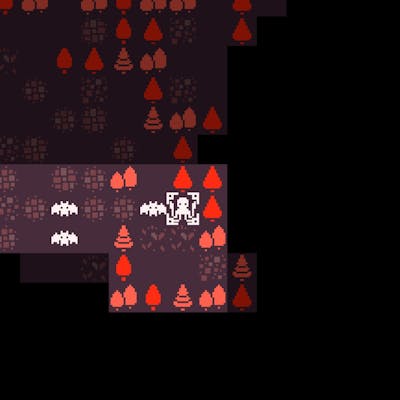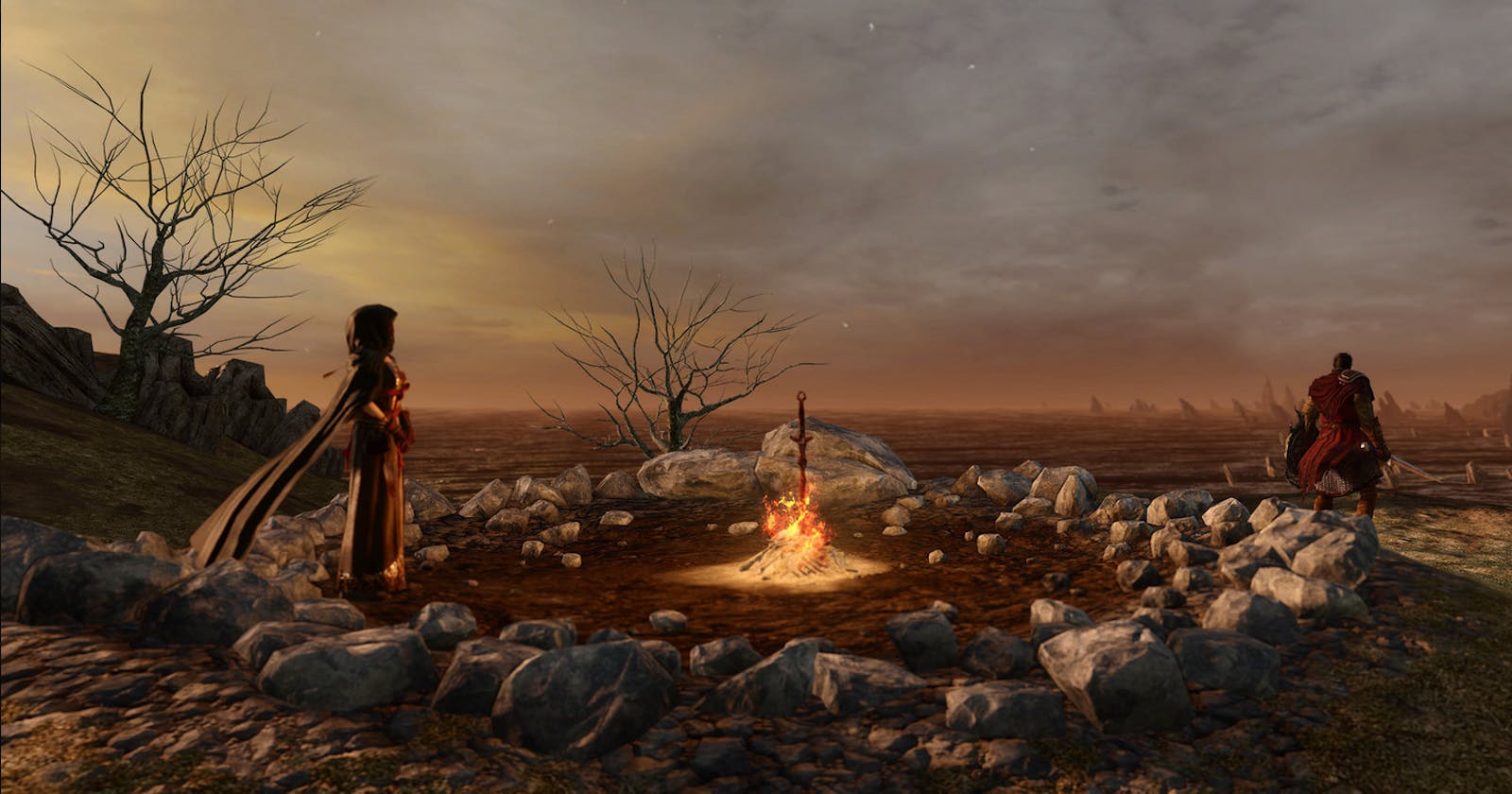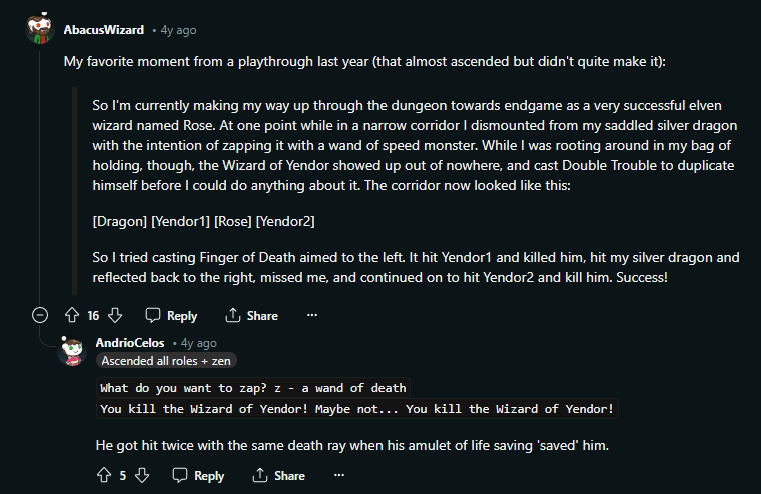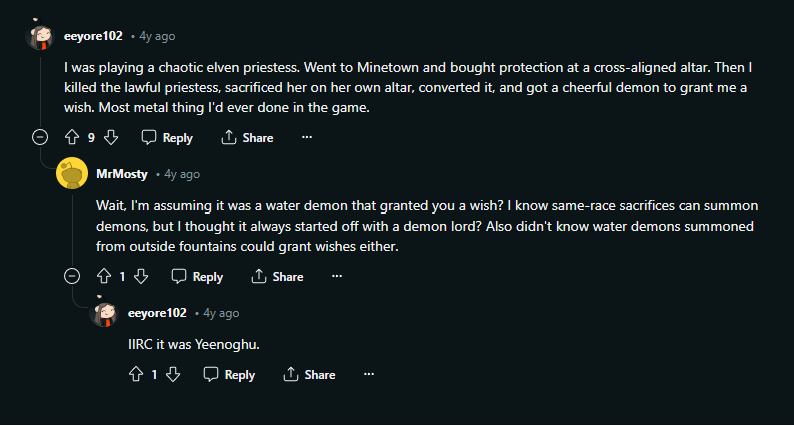To Design Between Souls and Rogues
I have a very old love towards roguelikes. I also have a new love towards soulslikes. These two have similar names, but let's go deeper...
I keep thinking about roguelikes and soulslikes a lot. The -likes suffix isn't even to blame, it's just two genres I enjoy a lot, and for a while, I went with the explanation that the latter of the two was just a branch from the prior, a sort of roguelite that took its own path. But then I stopped to actually consider what it shed to come into its own and realized it's... basically everything. Look: a proper, traditional roguelike is a grid-based, turn-based, permadeath game. Soulslikes are none of those things and yet, I get the same gist of feeling from both, and I wanted to know why.
The more or less conversational response I got to this topic was "well, both have you (as in, the player) get good at the game instead of valuing your in-game progression highly", and while so very true, I felt there was something deeper still. Something about the parts of those games that hook me in, so let's explore...
The Kitchen Sink Ideal
In a traditional roguelike (try Rogue, Nethack, ADOM, any of the crew, they will surprise you), there's two elements that had me going back all the time: the first comes from low expectations ("but they look so dang old!") and having the actual systems in the game massively jump over those same expectations. There is a deep systemic network behind a good roguelike, sometimes an architecture, sometimes moss growing over the bones of its creators, but it turns a standard run of the mill gauntlet into a festival of "wait, does this work? Really?!" moments. It requires you to open up to the idea that options could exist, and once you do - you're hooked.
Now you're the engineer of your own fun. You're exploring the crevices the game seemingly never wanted you to (and yet here we are). This hook is what I'll promptly call the kitchen sink ideal. "(Everything and the ) kitchen sink" because it could have everything and the above mentioned sink as far as you can know, and ideal because that isn't the reality of the situation -- you don't really get that.
If someone heard me rave about my Nethack adventures, it would never be about those hours of just traversing boring corridors and opening doors - it's about the five minutes of extreme fun when that ant colony showed up and I had to run, and ran right into a kobold meeting room... It's approximately a 1:10 ratio of extreme unexpected fun (like the moment your cursed ring of polymorph goes bananas) that sticks. You want more of that, so you remember it. The ideal forms in our heads:
This game allows for anything to happen, so I play on.
Lore and Arcana
The second element that brings me back to roguelikes is a very personal value I hold dear: I yearn to learn arcana. The more arcane, the better. Tell me random tidbits of a thing I know nothing about and it will live forever rent-free in my mind. What happens to rings when you toss them into sinks in Nethack? How do you go about stealing from the vaults in Brogue, if at all? If the game has lore, it also sticks! If it's combined, I've bitten hard and I'm not letting go. Lore and arcana sort of fit into the kitchen sink ideal by filtering it out: they define a ruleset for things to happen, and within that, we can do practically anything. Other people have the same rules, so we're not alone - we can communicate using this ruleset.
This game allows for anything to happen if we can figure out how, so we play on.
I just recently called roguelikes "singleplayer multiplayer games" because of this. It's a language, almost. From this perspective, soulslikes feel similar but somehow dull - I think it's the limited design space. They talk through items and lore snippets, but sometimes they turn to mechanics and tell you that if you equip this spear with this ash of war, and do this charge attack, then... well, something! But the same kind of singleplayer multiplayer feeling arises, the "oh thank you, I'm going to run home and try this right now!"
I guess you can see what catches my eye with Soulslikes: where most of the traditional roguelikes use symbols to leave to the theatre of the mind, to the player's imagination the world and design of the environment, Dark Souls is directed heavily. Where roguelikes linger, Dark Souls threads. A thought experiment comes to mind...
What If...? Curation, not separation
Imagine the roguelike of your dreams. You're playing it, having fun, you're careful and taking your time. Let's say you're playing one seed, treating it as the puzzle it could be, practicing the perfect run. Now, when you're done, imagine I come in and tell you that I too want to play that game, and even seed, and ask if you, with all of your infinite knowledge of this run, could curate it for me - I know that most of the roguelike experience is bothersome running around on autoexplore, and I'd like something more: a best of compilation. A rainbow of gameplay and the best pieces of procgen that you enjoyed: toss out and cut out all the tedium that doesn't result in a high or a tidbit-- I want to either be exploring and learning, or having a meaningful battle. I don't want to waste time, you see.
You start working on your crown jewel curated experience, and you quickly find the bits that rock! You bring them together, construct a megalevel from the many cutouts of what you consider fun, and you now sit and look at it -- there are while sections just missing. Our enemies, even bosses, aren't as dangerous as before because all the little parts that took 1HP here, caused fatigue here, or inflicted poison or bleed in that one long, meaningless corridor -- they're gone! Most of the things we now have are meaningful, they are curated. They are a part of your vision: you're setting me up to succeed but also to experience everything the game has to offer. Better have one fight with rats than twenty.
Looking at the changes, you realize you can now go all-out. We like the boss fights as they are, but there's enough space to just add a second phase -- same enemy, but changed patterns and behaviors. Second phases use wrapped emotions: you've gained an achievement for beating a boss, but it's actually a harder battle that you got as a reward. If you die after the first phase, you now know it's achievable - the kitchen sink ideal, albeit weakened by the curation, is still supported!
Alas, Death...

Now comes the hard part: you're thinking about my experience and you realize that in this context, if I die, you lose me. The curated experience roguelike has almost none of that random roguelikey goodness that I can expect from a clean new run... It would be wasteful to have me recycle through all of these one-time experiences that feel GREAT! if I have to repeat the whole thing every time. Instead, let's just have you return to the last fight. Not without consequences - we can even explain it away in some weird way (death was stolen from the world, it was denied by the god you're set to go kill, when you come back you're undead and can't use some of your otherwise available tools, etc.) - but much more forgiving and still curated. It works. Now you can focus on the boss at hand without context-switching from Juiblex's swamp back to the first level of the dungeons far above. Now you have something you think I can enjoy, and if your name is Hidetaka Miyazaki, you've got some more changes planned...
I'll leave out talking about turn-based vs animation-locked for some other time, but this thought experiment gave me new insights into what I want out of my roguelikes. Imagine if instead of procedurally generating levels, we thought about procedurally generating semi-curated experiences. It's not something no one has ever seen before (Caves of Qud, again, hits hard), but it's not something I see widely accepted and done throughout. At least I don't see it talked about in that way, either way. Imagine finishing a run and feeling elated because you just got a small Dark Souls experience, and next time you start, it will be different.



